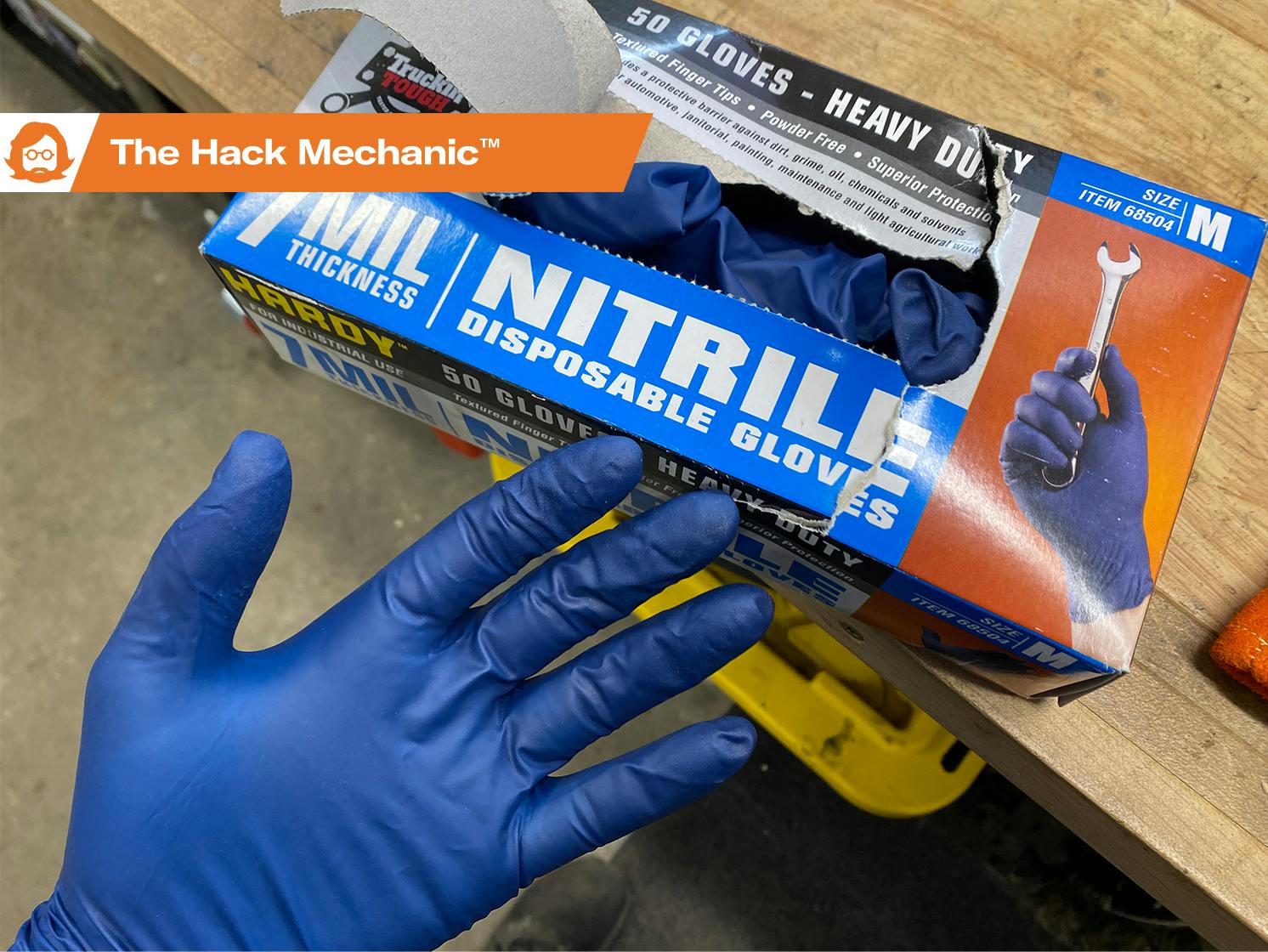Media | Articles
How to Glove Up Properly for Every Job in the Garage
For decades, I freely plunged my unsheathed skin into just about anything. The resulting grease under my fingernails was a badge of honor. At some point, though, I had a change of heart. There wasn’t a single event—it’s not like my hand slipped and skittered off into the greasy, angular automotive unknown and emerged gushing blood, at least not recently. My recalibration occurred during the resurrection of my Lotus Europa Twin Cam Special, when I committed to doing one thing every night (even just removing one nut and a bolt). On a vintage car, particularly a British one, it’s amazing how greasy your hands can get touching just two fasteners. Having to wash for longer than I had wrenched bugged me. Regular interactions with various automotive chemicals also made me more conscious of their dangers. Few of them will cause immediate horrific consequences, but there’s only so much gasoline and brake cleaner you want seeping through your pores into your bloodstream.
So let’s talk about preserving your automotive hands.

Regard your hands like infantry about to go behind enemy lines. Evaluate what hazards they face before plunging them toward that barely visible hose or bolt. Check whether there are sharp edges that can cut or scrape or ends of cables that can puncture. If you have to work around a running engine, be extremely careful of spinning components that can snag or slice. Even momentarily touching a finger against a belt or pulley can pull a ligament (ask me how I know). If you’re removing a component whose weight is non-trivial, know that gravity is going to do its thing and pull it straight down when the final fastener is withdrawn, so make sure your hands aren’t under it. And if you’re lifting an engine with a hoist, be aware that it is likely to suddenly swing to one side once it’s free; you don’t want your hand in the wrong place when that happens.
Last but not least, try to dial back the “You little so-and-so, you’re coming off now” when straining against a stuck fastener. Hand injuries commonly occur when the wrench slips or the bolt breaks. Avoid smacking the back of your hand against a sharp edge, as the tendons there are shallow and damage is likely to be more serious than a mere stitch-and-discharge ER visit—more like surgery and months of physical therapy. Likewise, it’s pretty easy to break a finger if your hand is curled around a wrench when it lets go. For these reasons, it’s generally better to push a ratchet or wrench with a fleshy, open palm.
But gloves, yes, absolutely. These days, I’m addicted to them. I divide them into four categories: disposable gloves, padded work gloves, thinly coated work gloves, and submersible gloves. Depending on how much you wrench, you may need all four. I do.
Marketplace
Buy and sell classics with confidence
Disposable Gloves

Forget latex. They tear if you look at them wrong and melt quickly if gasoline hits them. Single-use blue 3-millimeter-thick nitrile gloves, ubiquitous in the health and food service industries, are tougher and more gasoline-resistant. They’re available just about anywhere—hardware and auto parts stores, CVS—and are dirt cheap if you buy in bulk. Slip them on, and greasy hands be gone. No more 10 minutes of washing for five minutes of hands-on work. I use them for one-time-use tasks like spreading Permatex Aviation Form-a-Gasket.
For bigger jobs, I step up to 6-millimeter nitrile gloves, readily available on Amazon. Some have a textured grip. I happened into these rip-resistant industrial gloves and instantly liked them. They have two layers, which does make them more expensive, but they’re robust enough to survive multiple wrenching sessions.
Work Gloves

So-called work gloves overlap with “mechanic’s gloves” and gardening gloves. They’re typically thicker than disposable gloves and sometimes have padding to protect against sharp objects. Of course, there are trade-offs. You’ll be hard-pressed to spin small nuts onto fine threads without removing padded work gloves, and unless they’re thin and have an oil-resistant nitrile or polyurethane coating on the palms and fingers, they’ll rapidly absorb grease and other fluids.
My preference is thus to buy inexpensive packs of work gloves that I can replace frequently rather than splurge on a single $30 pair of “mechanic’s gloves.” There are plenty of fine choices here. I like these ultra-thin polyurethane-coated gloves with a nylon/polyester shell from Liberty Glove & Safety. They’re rugged enough to use for general mechanical work yet thin enough that they only affect dexterity when I’m doing the finest of tasks. They offer a decent measure of hand protection. They don’t rip as easily as nitrile (though my guitarist’s thumbnail does eventually wear out the top of the thumb from the inside). Unlike nitrile, they’re breathable, so your hands don’t marinate in their own sweat.
Of course, that last pro becomes a con when dealing with gas, brake cleaner, and other solvents, which immediately bleed through the non-coated areas and onto your skin. And if you get the non-coated portion of the gloves wet with some non-evaporating fluid like oil, antifreeze, or brake fluid, the moisture wicks up the weave and gets inside the palm and fingers. The gloves always feel slimy inside after that. But at a dollar a pair, I’m not hesitant to throw them out.
Submersible Gloves
If you’re changing an in-tank fuel pump or cleaning parts under a stream of solvent, you need chemical-resistant gloves that come up over your wrists and can be fully submerged. There are dozens of choices, most for under $15 a pair. Avoid household Playtex gloves, as they’re not specifically rated for gas or brake cleaner.
***
The main takeaway here is that you don’t need a pair of gloves—you need many pairs of multiple varieties. Select a type based on the specific job you’re doing. Having said that, occasionally, the best gloves are still none at all. I sometimes like feeling the steel of the ratchet handle in my hand. But having a barrier between my aging hands and jagged, greasy nastiness is a good thing.
***
Rob’s latest book, The Best Of The Hack Mechanic™: 35 years of hacks, kluges, and assorted automotive mayhem, is available on Amazon here. His other seven books are available here on Amazon, or you can order personally inscribed copies from Rob’s website, www.robsiegel.com.















Just the words: ‘Don’t you touch me with those dirty hands !’
5,7 and 10 mil. NITRILE gloves from the fine CCP (HFT) supply store.
I absolutely would not recommend less than 7 mil. I trike gloves. The 5 mil tear easily on any job other than food service. What good is a glove if it’s going to tear and your hands get dirty and exposed to chemicals anyway? DON’T CHEAP OUT HERE–the better 7 (or thicker) nitrile gloves are just pennies more.
I remember helping my father and his friends work on their cars when I wa a kid (mostly as a gopher), but a great learning and male bonding environment. This generation of men (all of which were manual laborers) could loosen nuts with their fingers. No offense but they would find this article as a hilarious read. Gloves in a garage! You very funny 😆
Bravo Rob, we need more voices advocating for your own health.
I didn’t heed the warnings and spent the first 10 years of my 18 year wrenching career being as stereotypically reckless as you expect from a diesel tech.
I saw the light halfway through, but I still got cancer at 34. (thankfully, recently surpassed 1 year cancer-free, yay!)
I’ve stopped wrenching professionally, saving those skills for my project cars and family’s cars. Now I teach. Workplace health & safety is one of my favourite parts.
I’m happy to report, the younger generation is a LOT more receptive to protecting themselves in the workplace, unlike the unfortunate attitudes I see here in the comment section, the industry is changing for the better. I’m hoping to see more of these young folks make the finish line, unlike a lot of their predecessors who unfortunately got cut short before we knew better.
Wasn’t trying to be “reckless” in commenting. Just a nostalgic observation of a past generation. Glad you are well. Btw, I definitely glove up when working with any solvents. I will say though, those men were superhuman because they had to be. Stay well sir.
I work in a unionized environment that employs on average around 200 diesel techs. You get to see the health effects of exposure over 30 years in a place.
Sadly, at least half of them leaving have the early stages of Parkinson’s or have/had battled various lung cancers from exposure to pre-emissions diesel in poorly ventilated shops.
Many of my father’s friends have passed or are battling various diseases, most of which could be attributed from chemical exposure at work (mechanics, firefighters, fabricators). Almost none of them have enjoyed a typical retirement. Cancer just recently took a friend at 68. Some of my own friends are also having some bizarre health issues, easily attributed to chemical usage and exposure.
Another thing to keep in mind is that we are using chemicals now that weren’t around 30 years ago. The next gen PFAS and solvents are more powerful than ever. I highly suspect even more health problems from the new chemicals. Not that chlorinated solvents, PCBs and good old PFAS were warm and cuddly.
So, I appreciate the article Rob. Its a good reminder and popularizes the use of PPE.
Having used gas to clean parts with numerous cuts oozing blood for 60 plus years I find gloves to be one of those “new gimmicks”.
For anyone interested I’ll say that unleaded gas stings less.
As I said in a previous comment. Gloves and PPE have their place so don’t call the a gimmick but I seldom need them. Gasoline, diesel nor other garage chemicals have ever caused any ill effects in cuts or abrasions I’ve suffered over the past 50+ years. And I have used brake cleaner to clean minor injuries. Stings like gas but the odor goes away quicker.
I agree with the post fully. I was the same, Oil, Gas, you name it. The Title pic shows a Harbor Freight Glove box. They sell them in 5, 7, and 9mil. I think the quality is a little less than many others but they are cheap and I find with the Harbor Freight brand that the 7mil work best. For most jobs the 9mil are too thick. With some of the better quality Nitirile gloves from Jegs, Summit, and others that come in 6mil thicknesses they seem to compare well with the Harbor Freight 7mil.
I never worried about my hands for many years and they pretty much got every kind of car-related chemical on them. I only wised up about 25 years ago. But now I have two kinds of cancer. One of which is very likely caused by solvents, according to the doctor.
Just saying, but I would suggest that you take his article seriously. I wish I had known that back in the day.
Nitrile gloves are great for a number of reasons. Ive been a mechanic for over 40 years and for years the first part of foreplay for me and my wife was a check for dirty fingernails. LOL